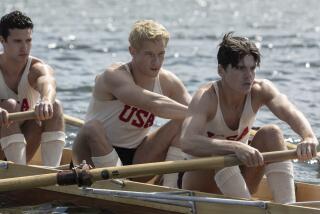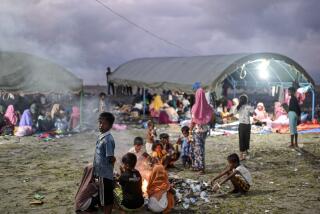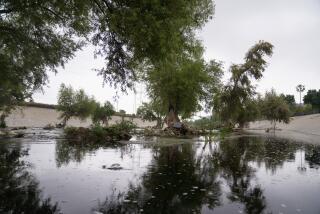In the Sumatran jungle, lessons on the river to school
TELUK MERANTI, INDONESIA — They’re equatorial Huckleberry Finns, two wild-hearted boys guiding an old wooden fishing boat along a wide and mighty river.
Fandi and Alfan, brothers with one name each, live in a remote village in the heart of the Sumatran jungle, at once a protected and dangerous place to be a child.
Most mornings they rise before their rooster crows, bolting down a meager breakfast of coconut and chile-spiced vegetables over rice before venturing out on their journey: rowing to school aboard a hand-carved 15-foot sampan.
Barely 12, with large brown eyes and stick-like arms, Fandi is 3 years older than his brother -- in his eyes almost a man.
“I am older,” he said sternly. “I do more rowing. But sometimes the work is hard, especially when the current is strong.”
Here on the vast Kampar peninsula, a land carpeted with dense forests and veined by unpredictable rivers, many isolated communities without their own schools or road access must send children such as Fandi and Alfan out onto the busy river highway.
The boys’ father, a farmer too busy growing rice to shepherd them to school, offers his sons advice: Row hard and watch for danger.
Along the muddy-brown Kampar River, there are no kindly school crossing guards, no lumbering yellow buses, no lines of parents jockeying for parking space to deposit their little ones, with last-minute reminders of forgotten books and raincoats.
On their hourlong row, the boys negotiate a two-mile commute along a river teeming with giant barges, invisible logs and islands of floating water hyacinth to tangle their oars.
This is no Mississippi. These waters are full of crocodiles and poisonous snakes. Worse is the dreaded bono, a rogue wall of water that rumbles up from the nearby ocean, overturning boats and claiming victims.
The currents are fickle and the boys often must wait an hour after school to catch the right conditions to head home. But their plodding pace allows the sights and sounds of the jungle to reveal themselves, and the thrum of life they know is packed into the dense foliage onshore.
They pass rice farmers tending riverside plots, fishermen dragging homemade nets; they hear the roar of heavy machinery as big companies from the city move in to clear the jungle and set up plantations.
One day, villagers crowded around a large net that some fishermen had dragged out of the water. They had caught a 20-foot python. For the smallest boys who must negotiate the river each day, the snake was like a monster from the deep.
“Sometimes, I’m scared,” said Megi, an 8-year-old friend of Alfan’s who makes a similar trip to another village. “I’m just a boy.”
Local officials are practical about such perils. Forest children, they say, must grow up fast.
“It’s dangerous,” said Ali Mursidin, an official in Teluk Meranti, a town of 2,500 people. “But this is our life here. Children must live it the way it is.”
Teluk Meranti’s four schools serve children ages 5 to 18. Many live in the town and walk or ride motorbikes to school. But scores of others from surrounding villages must negotiate the river. That frightens some teachers.
“I worry about them,” said Mardiana, who, like the brothers, goes by one name. “Many are so small. The boats are unstable.”
Marzuki Effendi, a sociology teacher here, said he and his brother rowed to school for years. Twice they were struck by bono waves, which upended their boat and swallowed their belongings.
Effendi laughed as he recalled having to tell his teacher that he lost his homework in the river.
“They understood, just like I do,” he said. “Teachers know for many students there is no other way to get to school.”
Students have been riding the Kampar River for half a century, since the first school was built in the area in the 1960s. Back then, many trips took two hours each way. Eventually, more schools were built, cutting travel times.
A few years ago, officials built a jungle road that will soon make the school boats obsolete, giving children the option of walking or riding motorcycles to school. But a major bridge connecting Teluk Meranti with other villages has yet to be finished.
The delay doesn’t bother Fandi and Alfan. For them, the Kampar River is their local street corner, a place where they play and test themselves, becoming excellent swimmers.
On a recent day, still dressed in his school uniform -- pink plaid shorts and matching tie -- Fandi launched his sampan from a sagging dock with rotting boards. After school, he had picked up a plastic jug of kerosene for his mother, which he stowed along with his green backpack.
On many days, the boys pass boatloads of girls wearing traditional Islamic head scarves, four to each craft, who drift slowly along the river, taking turns at the helm on their own long row home.
His gaze focused, Fandi stood for better leverage, extending two long oars into the water. The handles crossed at his chest, he pushed outward, propelling the boat forward, lifting the oars from the water as he felt it surge forward.
Push. Lift. Wait. Repeat.
Along the way, the brothers often talk about their day or the games they play at home. But when the rowing gets tough, the boat goes silent. They try to stay near shore but often have to venture out into the open river where the currents are stronger.
A weary Fandi sometimes hands the oars over to his brother. Secretly, Alfan would like to row more, but he knows his place.
Yet when the need arises, he said, “I’m ready.”
Sometimes, when his older brother is running late, Alfan leaves school without him, knowing his brother will catch a ride with someone. The younger boy takes the sturdy little boat by himself and rows alongside a friend, like a kid trying out a new bike in the neighborhood without supervision.
Many days, the boys arrive at school tired and sweaty after a hard row. But on this afternoon, even with the temperature in the 90s and the humidity stifling, the river was easygoing for the return journey. The boat was mirrored in the calm waters.
Even when the new bridge is finished, Fandi said, he isn’t sure he wants to give up his daily row. The trip is quicker on water. The river is what he knows.
The boat pushed on, carrying these two river boys back home. Today, at least, there would be no lighting out for the territory. --
More to Read
Sign up for The Wild
We’ll help you find the best places to hike, bike and run, as well as the perfect silent spots for meditation and yoga.
You may occasionally receive promotional content from the Los Angeles Times.







